Room Maintenance Checklist Samples
-
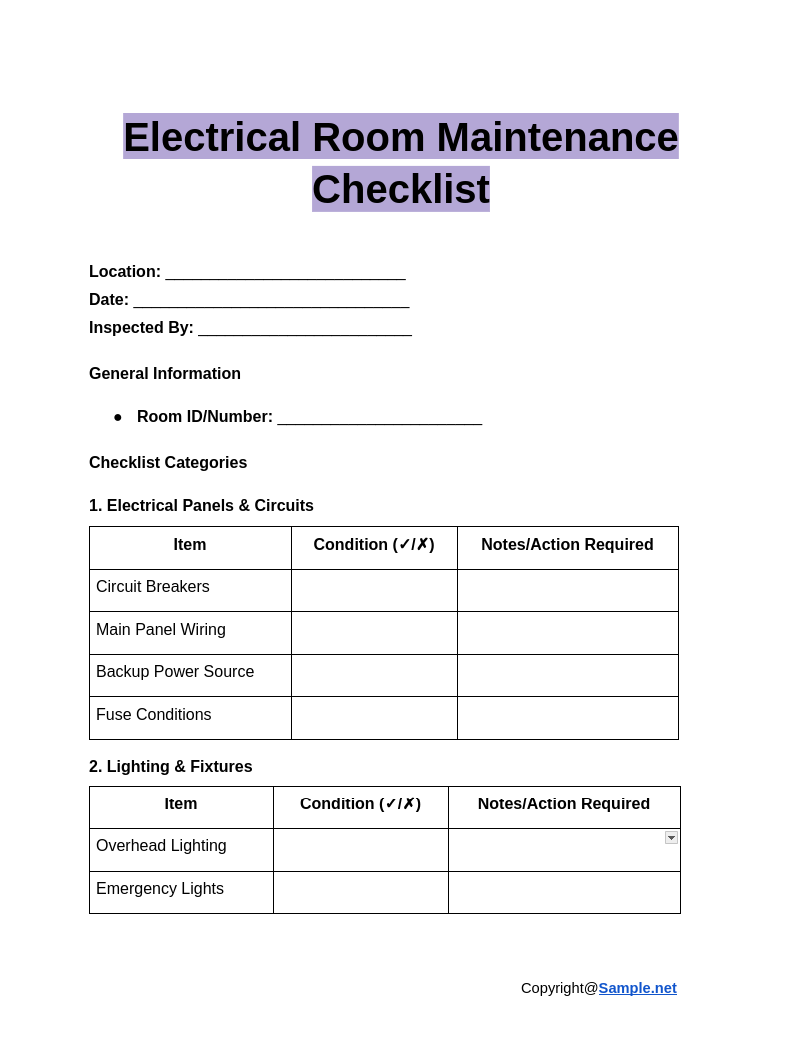
Electrical Room Maintenance Checklist
download now -
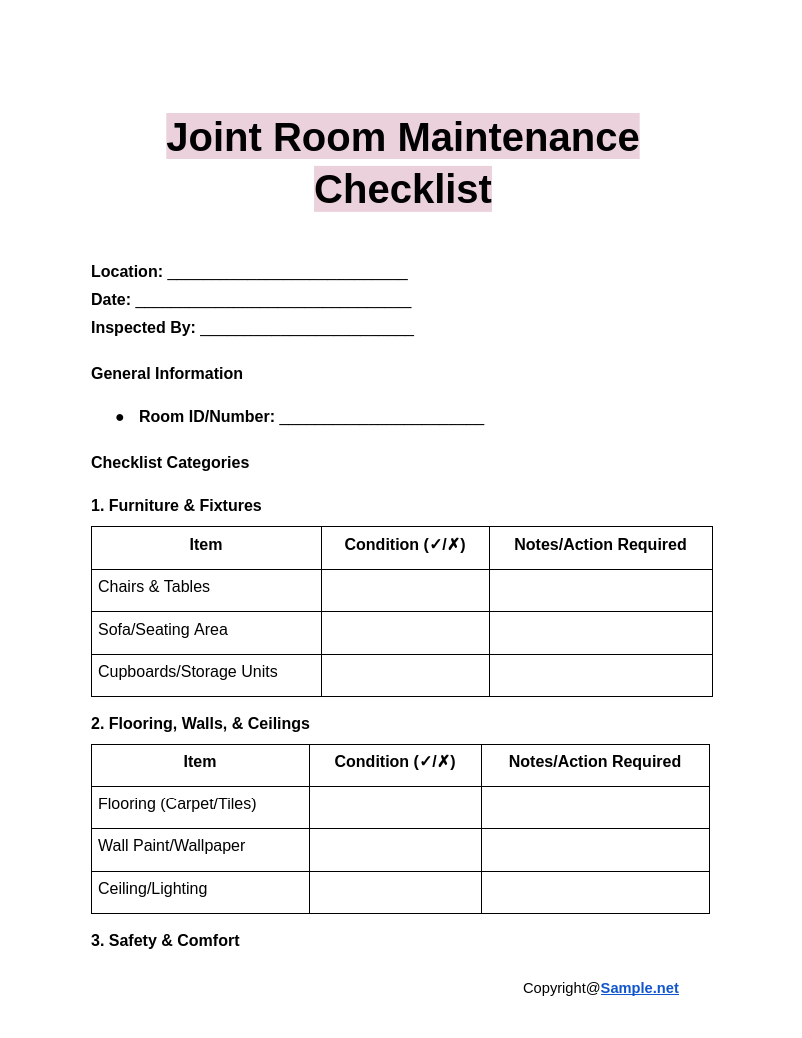
Joint Room Maintenance Checklist
download now -
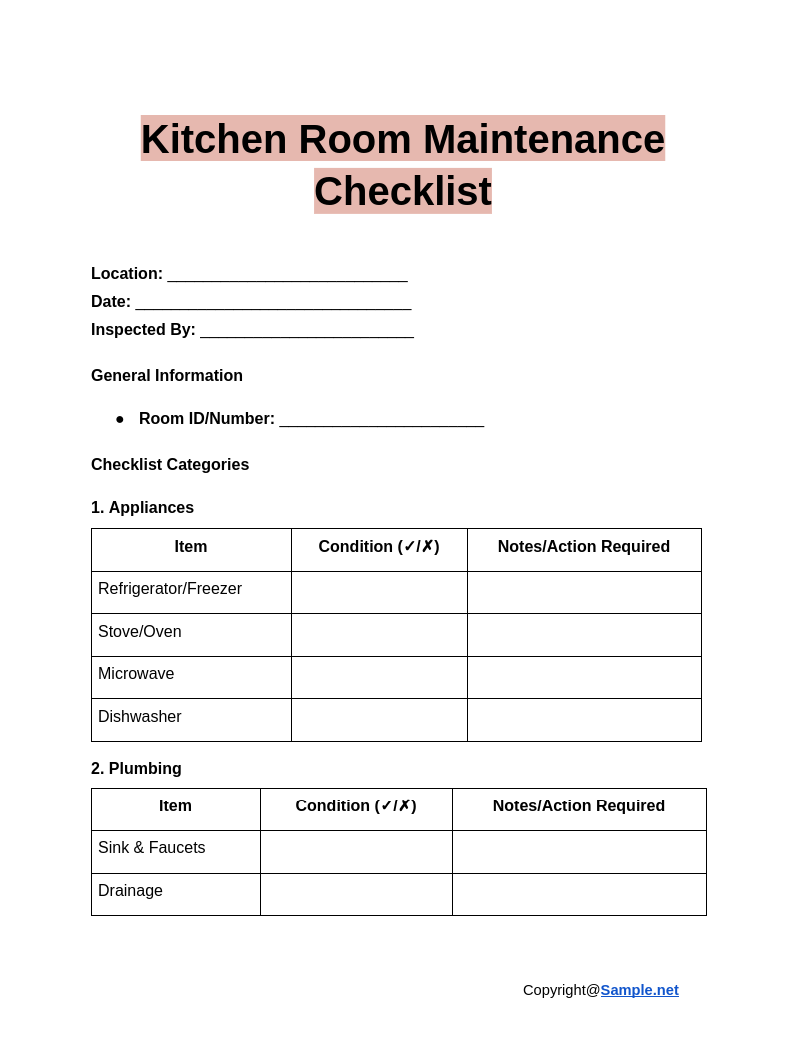
Kitchen Room Maintenance Checklist
download now -
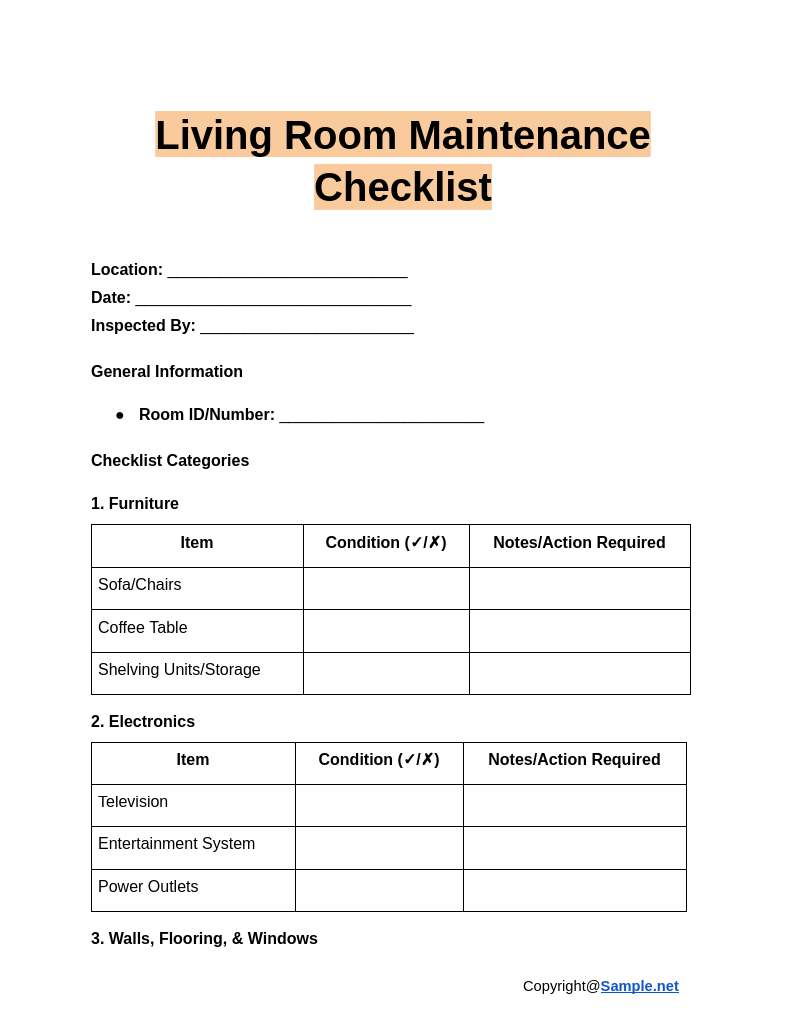
Living Room Maintenance Checklist
download now -
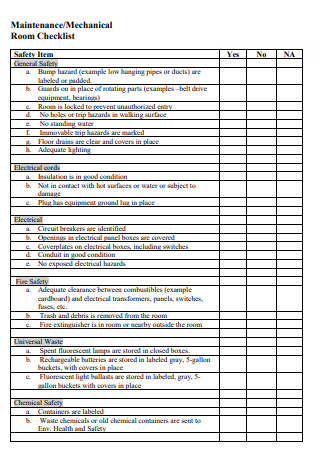
Housekeeping Mechanical Room Maintenance Checklist
download now -
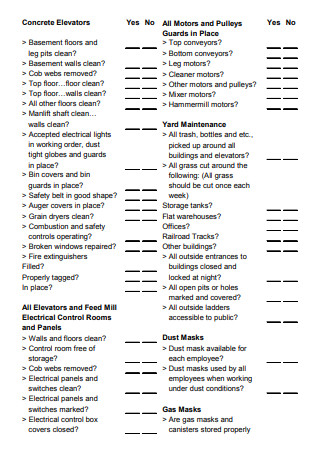
Sample Hotel Room Maintenance Checklist
download now -
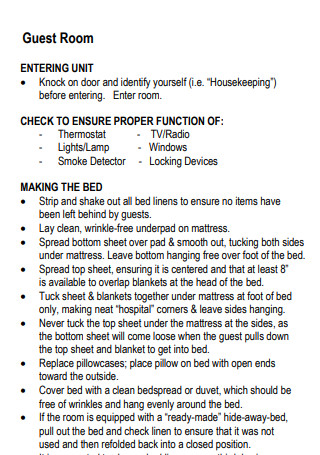
Guest Room Inspection Maintenance Checklist
download now -
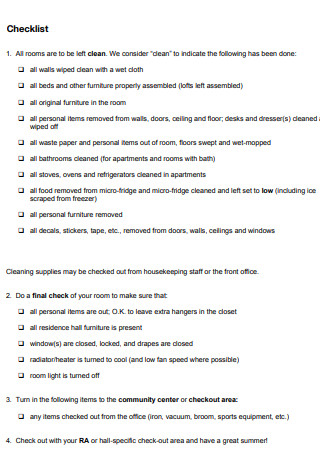
Server Room Preventative Maintenance Checklist
download now -
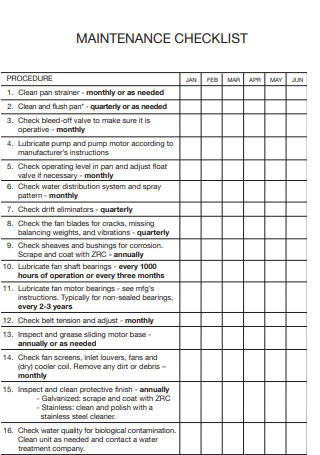
Weekly Store Room Maintenance Checklist
download now -
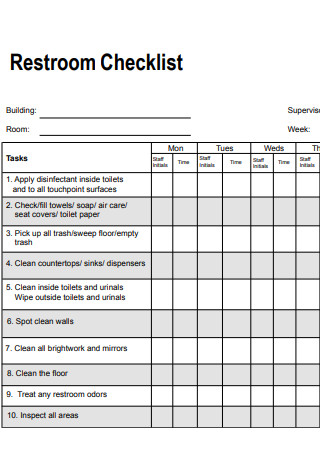
Rest Room Maintenance Cleaning Checklist
download now -
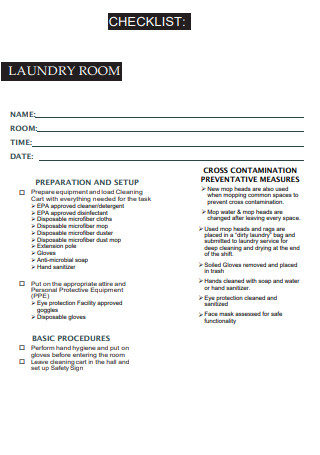
Laundry Room Routine Maintenance Checklist
download now
FREE Room Maintenance Checklist s to Download
Room Maintenance Checklist Format
Room Maintenance Checklist Samples
What is a Room Maintenance Checklist?
Purpose of a Room Maintenance Checklist
How to Create a Room Maintenance Checklist
FAQS
How does a Room Maintenance Checklist improve efficiency?
What should be included in a Room Maintenance Checklist?
How do Room Maintenance Checklists contribute to safety?
What are the benefits of categorizing tasks in a checklist?
What challenges arise in creating a Room Maintenance Checklist?
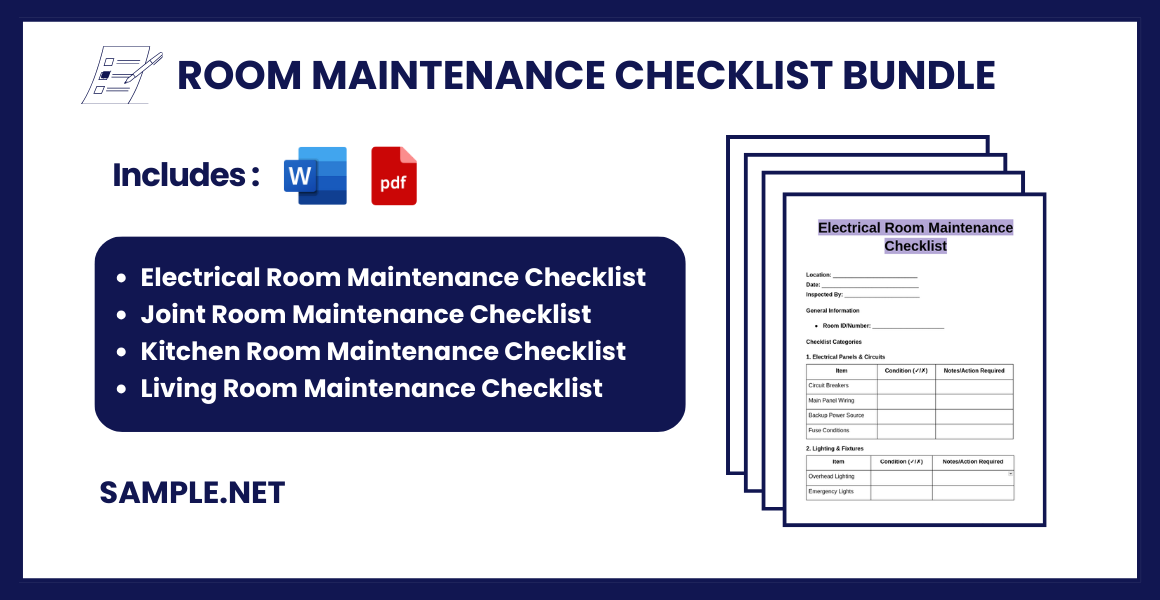
Download Room Maintenance Checklist Bundle
Room Maintenance Checklist Format
Location: ___________________________
Date: _______________________________
Inspected By: ________________________
General Information
- Room Number: _______________________
- Room Type: _________________________
Checklist Categories
1. Furniture & Fixtures
| Item | Condition (✓/✗) | Notes/Action Required |
|---|---|---|
| Bed Frame & Mattress | ||
| Chairs & Tables | ||
| Cupboards/Drawers | ||
| Curtains/Blinds | ||
| Lights/Lamps |
2. Walls, Floors, & Ceilings
| Item | Condition (✓/✗) | Notes/Action Required |
|---|---|---|
| Walls (Paint/Damage) | ||
| Flooring (Carpet/Tiles) | ||
| Ceiling | ||
| Skirting Boards |
3. Electrical & Appliances
| Item | Condition (✓/✗) | Notes/Action Required |
|---|---|---|
| Air Conditioning/Heater | ||
| Power Outlets | ||
| Television/Remote | ||
| Refrigerator |
4. Bathroom
| Item | Condition (✓/✗) | Notes/Action Required |
|---|---|---|
| Sink & Taps | ||
| Shower/Bathtub | ||
| Toilet | ||
| Mirrors | ||
| Ventilation/Exhaust Fan |
5. Safety & Security
| Item | Condition (✓/✗) | Notes/Action Required |
|---|---|---|
| Smoke Detectors | ||
| Door Locks | ||
| Window Locks | ||
| Emergency Exits |
6. Cleanliness & Supplies
| Item | Condition (✓/✗) | Notes/Action Required |
|---|---|---|
| Room Cleanliness | ||
| Linens (Bedsheets/Towels) | ||
| Toiletries Replenished | ||
| Trash Bins Emptied |
Action Plan for Repairs/Issues
- Issue Identified: _______________________________________
Action Required: _______________________________________
Assigned To: __________________________________________
Deadline: _____________________________________________
Comments/Additional Notes
What is a Room Maintenance Checklist?
A Room Maintenance Checklist is a detailed document that outlines the tasks required to maintain a room’s cleanliness, functionality, and safety. It includes routine inspections, cleaning tasks, repair schedules, and safety checks, ensuring no aspect is overlooked. Designed for efficiency and consistency, these checklists cater to various environments like homes, offices, hotels, and healthcare facilities. By following a checklist, property managers or homeowners can ensure that rooms remain in excellent condition and are ready for use. You can also see more on Housekeeping Checklist.
Purpose of a Room Maintenance Checklist
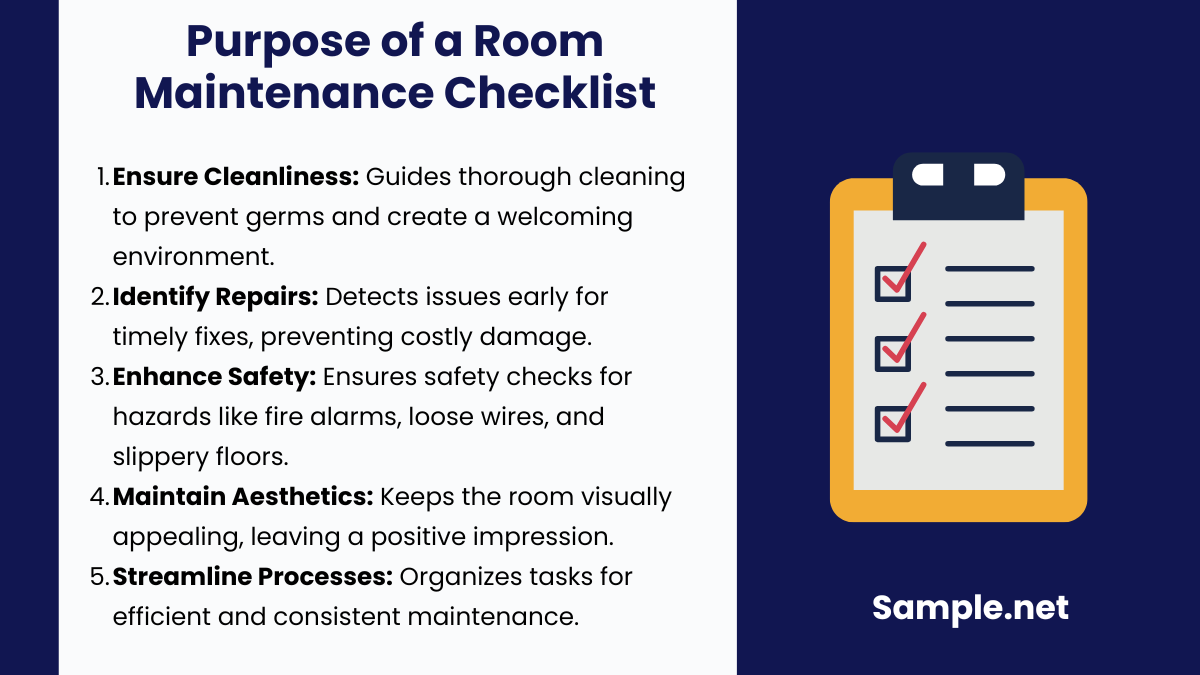
1. Ensuring Cleanliness and Hygiene
The checklist serves as a guide for thorough cleaning, ensuring every corner of the room is spotless. Tasks such as dusting, mopping, disinfecting surfaces, and washing linens are included. By maintaining cleanliness, the checklist helps prevent the spread of germs and creates a welcoming environment. Hygiene is particularly critical in hospitality and healthcare settings, where it directly impacts user satisfaction.
2. Identifying Repairs and Maintenance Needs
Routine use of a room can lead to wear and tear, such as broken fixtures, leaking taps, or malfunctioning electrical outlets. The checklist helps identify these issues early, allowing for timely repairs. Addressing problems promptly prevents them from escalating into costly repairs and ensures the room’s functionality is maintained. You can also see more on Room Inspection Checklist.
3. Enhancing Safety Standards
A well-maintained room is a safe room. The checklist ensures that safety aspects like smoke detectors, fire extinguishers, and emergency exits are regularly inspected. It also includes checks for loose wires, slippery floors, or other hazards that could cause accidents. By prioritizing safety, the checklist protects both occupants and property.
4. Maintaining Aesthetic Appeal
Regular maintenance ensures the room remains visually appealing, with clean walls, polished furniture, and well-maintained décor. A visually pleasing room leaves a positive impression on guests and users, especially in the hospitality sector. This purpose is essential for upholding an organization’s reputation or increasing the value of a home. You can also see more on Guest Room Checklist.
5. Streamlining Maintenance Processes
The checklist organizes tasks in a logical, easy-to-follow manner, making maintenance more efficient. By standardizing procedures, it ensures consistency, especially when multiple rooms need attention. This is particularly beneficial for facility managers, cleaning staff, and property owners who aim to maintain high standards without missing critical tasks.
How to Create a Room Maintenance Checklist
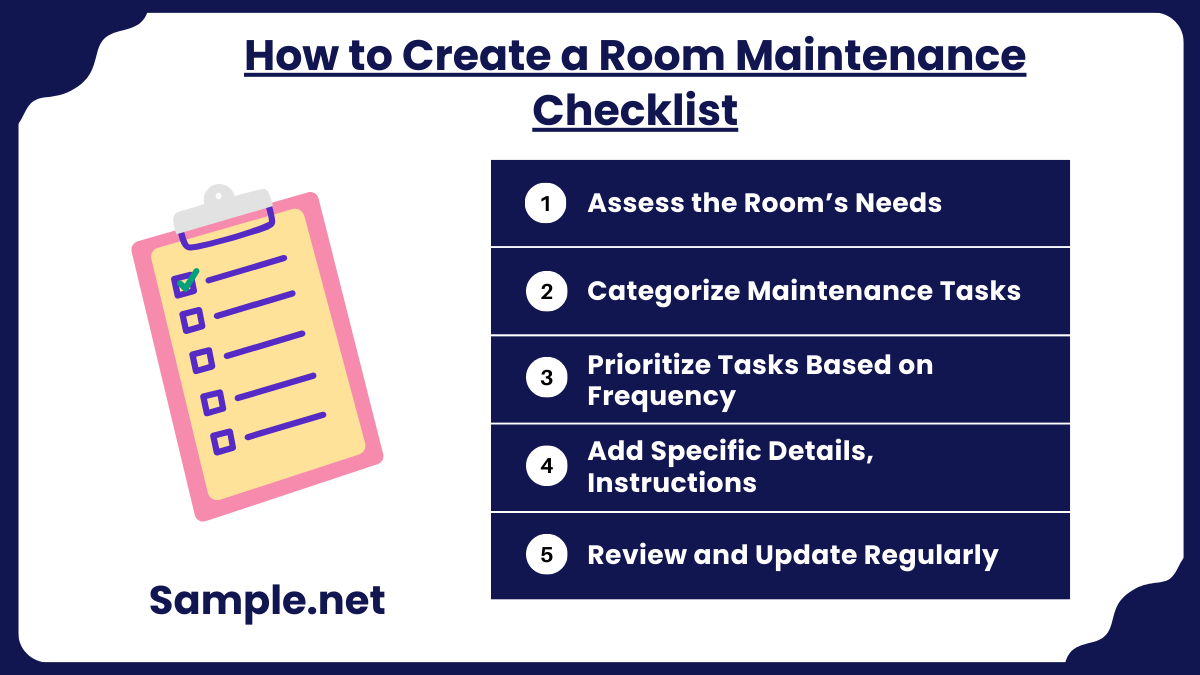
Step 1: Assess the Room’s Needs
Begin by identifying the specific maintenance requirements of the room. Consider its purpose, usage frequency, and any unique features. For instance, a hotel room may require daily cleaning, while a storage room may need only occasional checks. Understanding the room’s needs ensures that the checklist is tailored and relevant. You can also see more on Facility Maintenance Checklist.
Step 2: Categorize Maintenance Tasks
Divide tasks into categories like cleaning, repairs, inspections, and safety checks. Breaking down the checklist into sections makes it easier to follow and ensures nothing is overlooked. For example, under cleaning, list tasks like dusting, mopping, and disinfecting, while under repairs, include checking fixtures and furniture.
Step 3: Prioritize Tasks Based on Frequency
Determine which tasks need to be performed daily, weekly, monthly, or seasonally. High-priority tasks like cleaning surfaces should be done frequently, while deep cleaning or system inspections can be scheduled less often. Assigning frequencies helps streamline the maintenance schedule.
Step 4: Add Specific Details and Instructions
For each task, provide clear instructions to ensure consistency. For instance, instead of simply writing “clean windows,” specify “use a glass cleaner and microfiber cloth to clean windows thoroughly.” Including details reduces ambiguity and ensures tasks are completed to standard. You can also see more on Building Maintenance Checklist.
Step 5: Review and Update Regularly
Test the checklist in real-world scenarios and gather feedback from users, such as cleaning staff or maintenance personnel. Update the checklist periodically to reflect changes in room usage, new equipment, or updated standards. A dynamic checklist remains relevant and effective.
FAQS
How does a Room Maintenance Checklist improve efficiency?
By organizing tasks and standardizing procedures, the checklist ensures no task is missed. It reduces time spent figuring out what needs to be done and ensures that maintenance is thorough and systematic. This boosts productivity, especially when managing multiple rooms. You can also see more on Rental Inspection Checklists.
What should be included in a Room Maintenance Checklist?
A checklist should include cleaning tasks, repair inspections, safety checks, and periodic maintenance activities. Each task should have clear instructions, such as tools required and the frequency of execution. Including all aspects ensures comprehensive room care.
How do Room Maintenance Checklists contribute to safety?
Safety checks in the checklist ensure that hazards like loose wires, malfunctioning smoke alarms, or slippery floors are identified and addressed. Regular inspections prevent accidents and ensure the room meets safety standards, protecting occupants and reducing liabilities. You can also see more on Predictive Maintenance Checklist.
What are the benefits of categorizing tasks in a checklist?
Categorizing tasks into cleaning, repairs, inspections, and safety simplifies navigation and execution. It allows workers to focus on one category at a time, improving efficiency. Additionally, it ensures no critical area of maintenance is overlooked.
What challenges arise in creating a Room Maintenance Checklist?
Challenges include overlooking specific tasks, failing to update the checklist for new needs, or making it too complex to follow. Balancing comprehensiveness with simplicity is key. Feedback from users can help refine the checklist. You can also see more on Server Maintenance Checklist.
